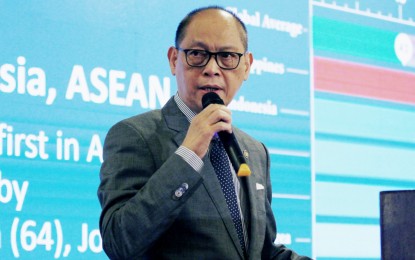
BSP Governor Benjamin Diokno. (File photo)
MANILA – Bangko Sentral ng Pilipinas (BSP) Governor Benjamin Diokno described as uncalled for the observations that the central bank is carrying most of the weight of the government's response to the impact of the coronavirus disease 2019 (Covid-19).
“We continue to work closely with the fiscal authorities. We can act faster because the central bank is autonomous. We don’t need Congressional action or something like that. So, we thought that given the pandemic, we have to infuse liquidity into the system,” Diokno said during the "Emerging Market Debt: A Roadmap Beyond Covid-19" webcast hosted by Bloomberg on Thursday night.
The liquidity infusion was made through a reduction of 175 basis points in the BSP’s key policy rates, 150 basis points of which were made at 50 basis points each between March and June while the government was fighting the pandemic.
Aside from the key rate cuts, the BSP also reduced big banks’ reserve requirement ratio (RRR) by 200 basis points – half of the 400 basis points that the Monetary Board (MB) authorized Diokno to implement this year – to infuse additional liquidity needed by the economy during this period.
Diokno placed the amount of liquidity that will be released because of these measures at about PHP1.4 trillion or about 7 percent of the gross domestic product (GDP).
The central bank has also entered into a repurchase agreement with the national government wherein the BSP extended PHP300 billion in financing for the Covid-19 response.
Under the agreement, the fund extended by the central bank would be used to purchase government securities and the period by which the government should give the funds back is three months, although this may be extended by another three months.
Diokno said this repurchase agreement is “perfectly legal and provided for in our Charter.”
The BSP Charter, he said, allows the central bank to lend to the national government an amount that is equivalent to 20 percent of the latter’s average revenues in the past three years, which to date is about PHP540 billion.
“Because of the pandemic, government revenues are reduced and at the same time, the government has to spend a lot of money for granting aid, subsidies, and for beefing up our health system. So higher spending, lower revenues. They need money, so we create them. We entered (into) a repo arrangement with them,” Diokno said.
During the same briefing, Finance Secretary Carlos Dominguez III, who is part of the central bank’s seven-man MB as the Cabinet member designated by the President to the Board, said the national government is “assisted by the central bank” in the Covid-19 response “but mostly our financing has come from our domestic commercial borrowings, as well as foreign borrowings.”
Dominguez said the Philippines is experiencing the impact of the pandemic on a very strong position, with the ratio of debt to GDP at its record-low of 39.6 percent and the government is now gaining the benefits of the tax reform measures pushed since the start of the Duterte administration in 2016.
“So we have a lot of space here. And, you know, we see that our economy is going to be hit hard. Probably, we will shrink by maybe about three-and-a-half percent this year but we’re ready for a big bounce back next year,” he said.
Dominguez also said the unexpected 50 basis points reduction in the BSP’s key policy rates on Thursday was really needed.
“Essentially, we’ve seen that we have to bring back confidence to our bankers. We have to bring bank confidence to our consumers. Our economy is about 70 (percent) to 75 percent consumption-driven, so it is utmost important that we bring back the confidence of our public,” he added. (PNA)
